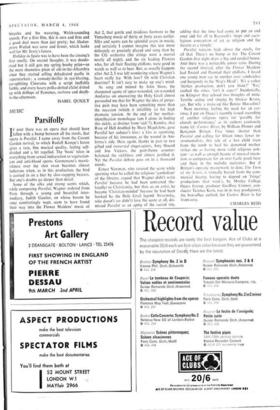MUSIC
Parsif oily
TF ever there was an opera that should have 'fallen with a bump between all the stools, that opera is Parsifal. I came away from the Covent Garden revival, to which Rudolf Kempe's baton gives a rare, fine musical quality, feeling self- divided and a bit repelled. The 'book' takes in everything from sexual indiscretion to vegetarian- ism and anti-blood sports. Gurnemanz's mawk- ishness over the shot swan becomes almost ludicrous when, as in this production, the bird is carried in on a bier by slow-stepping bearers. But one's doubts go deeper than detail.
Some of the silks and strong scents which, while composing Parsifal, Wagner ordered from Paris through a young and beautiful inter- mediary, Judith Gautier, on whose bosom he once comfortingly wept, seem to have found their way into the Flower Maidens' music of Act 2, that gentle and insidious footnote to the Venusberg music of thirty or forty years earlier. Silks and scents can be splendid assets in music; and certainly I cannot imagine this text more delicately or precisely played and sung than by the CG orchestra (the strings were a marvel nearly all night), and the six leading Flowers who, for all their floating chiffons, were good to watch as well as to hear. But, as usually happens after Act 2, I was left wondering where Wagner's heart really lay. With luxe? Or with Christian doctrine? It isn't easy to make up one's mind.
As sung and mimed by John Shaw, the sharpened agony of spear-wounded, sin-wounded Amfortas on uncovering the Holy Grail almost persuaded me that for Wagner the idea of purga- tive pain may have been something more than the occasion (which it infallibly is) for high dramatic tension. At the end of her mother- identification monologue (am I alone in finding this sickly, as distinct from `sick'?), Kundry, that Rose of Hell doubled by Mary Magdalene, gave Parsifal her seducer's kiss: a kiss as agonising, because of his innocence, as the wound in Am- fortas's side. Here again, thanks in part to two gifted and immersed singer-actors, Amy Shuard and Jon Vickers, the pain-theme counter- balanced the sickliness and almost justified it. Yet the Parsifal debate goes on in a thousand minds.
Ernest Newman, who revered the score while spurning what he called the religious 'symbolism' of the libretto, argued that Wagner didn't write Parsifal because he had been converted (be- latedly) to Christianity, but that, as an artist, he became 'Christian-minded' because he had been hooked by the Holy Grail legend. Stravinsky, who doesn't (or didn't) love the score at all, dis- missed Parsifal as an aping of the sacred rite, adding that the time had come to put an end once and for all to Bayreuth's 'inept and sacri- legious conception of art as religion and the theatre as a temple.'
Parsifal remains high above the stools, for all that. There's no bump so far. The Covent Garden first night drew a big and cordial house. And there was a noticeable junior ratio. During the second interval, after the Flower Maidens had floated and flaunted their chiffons, I heard one young man say to another over sandwiches and burgundy in the `Nag's Head': 'It's a rather 'thirties production, don't you think?' Yes,' cxubed the other, 'isn't it super!' Incidentally, on Klingsor they echoed two thoughts of mine. Terrific acting and singing by Otakar Kraus, yes. But why a make-up like Benito Mussolini?
Next morning, feeling the need for an car- rinse, I put on Decca's recently issued recording of another religious opera (or 'parable for church performance,' as its authors cautiously name it): Curlew River, by William Plomer and Benjamin Britten. Five times shorter than Parsifal and calling for fifteen times fewer in- strumentalists, this tale of a lost child risen from the tomb to heal his demented mother strikes me as having more valid religious con- tent—as well as enough beauty of musical inven- tion to compensate for an over-facile patch here and there in the melodic recitatives. But if Britten's operatic masterwork to date, The Turn of the Screw, is virtually barred from the com- mercial theatre, having to depend on 'fringe' productions (last week's, by Morley College Opera Group, producer Geoffrey Connor, con- ductor Terence Kern, was in its way prodigious), the box-office outlook for Curlew River is far from cosy.
CHARLES REID


































 Previous page
Previous page